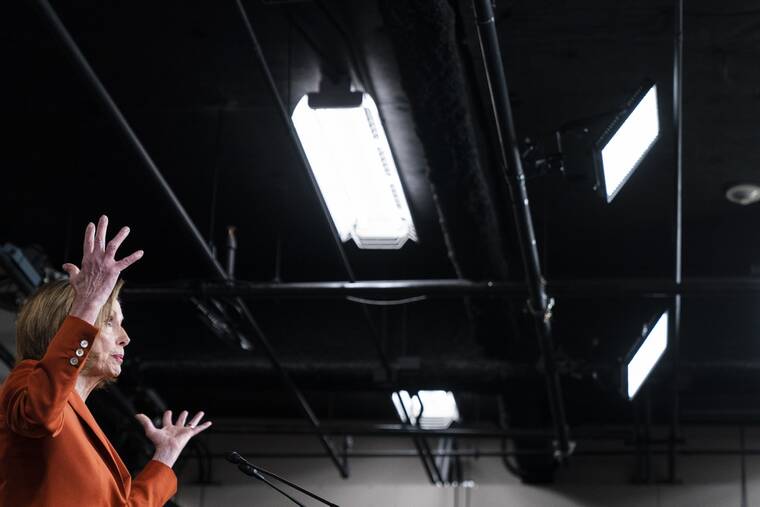End of COVID funds? House eyes $15.6B, but outlook dim
WASHINGTON — This could be the end of the line for congressional funding to fight COVID-19.
What started a month ago as a $30 billion request from the White House to prepare for the next phase of the pandemic has been slashed, reduced and fallen apart on Capitol Hill.
The end result Wednesday was a $15.6 billion package prepared by House Democrats that has almost no chance of passing in the evenly divided Senate, where Republicans have indicated they are unwilling to provide more money without cuts elsewhere or a full accounting from the Biden administration of already-approved virus funding.
That means it’s highly likely no new federal money will be readily approved to fight COVID as the pandemic moves to what many officials are now calling the endemic stage.
House Speaker Nancy Pelosi called the turn of events “heartbreaking.”
The idea had been to add President Joe Biden’s request for new virus aid to the massive $1.5 trillion spending bill, a must-pass measure needed by week’s end to keep the federal government operating through the end of the fiscal year.
Biden’s initial $30 billion request was reduced to $22 billion when the administration submitted it to Congress, as the White House warned the U.S. will soon begin to run out of money to bolster COVID-19 testing supplies and to guarantee that uninsured Americans keep getting free treatment for the virus.
But as Democrats and Republicans negotiated on Capitol Hill, the final COVID funding package was slashed further to $15.6 billion as part of the broader budget deal. Most of the money would have gone to increasing U.S. supplies of vaccines, treatments and tests and battling the disease around the world.
Pelosi’s compromise backfired as rank-and-final Democrats revolted Wednesday over the final product.
A White House official said late Wednesday that without COVID resources the situation will be “dire” for the American people. The official was granted anonymity to discuss the situation.
As part of the deal, Republicans insisted that the $15.6 billion COVID-19 aid package be fully paid for, offset by repurposing untapped virus aid that has been promised to the states. Dozens of Democrats counting on that money indicated their opposition to what was seen as an unfair swap.
“To turn around and now say we’re taking hundreds of billions of dollars back in the name of bipartisanship is just unbelievable,” said Rep. Cori Bush, D-Mo.
Bush was among several Democratic lawmakers who said their states had already planned to use the money for health care, child care, schools and other essentials during the coronavirus crisis. Bush said she would “vehemently oppose efforts to snatch back the lifesaving resources we need to fully and equitably recover from this pandemic.”
Rep. Debbie Dingell, D-Mich., said in an interview that her state would have lost nearly $600 million in pandemic assistance that it was entitled to. “My job is to fight for the people of Michigan,” she said.
Pelosi had no choice but to abandon the plan. Instead, the Democratic leader pushed forward a standalone COVID bill that doesn’t rely on the offsetting funds, a strategy that ensures more party support but is certain to lose Republican backing. A planned Wednesday vote was postponed until next week.
If approved, the package would face an uncertain outcome in the the Senate, where Republicans have made it clear they are unlikely to back any new pandemic aid unless the previously approved funds are spent.
A letter from Sen. Mitt Romney, R-Utah, and signed by 35 other Republican senators regarding Biden’s initial request said, “It is not yet clear why additional funding is needed.”
The senators said they wanted “a full accounting” of how some $6 trillion in government funds from the outbreak of the pandemic has been spent.
The White House official said failing to act now on COVID funding will have “severe consequences” for the American people.
In March, COVID testing capacity would decline; in April, the fund that offers coverage for testing and treatments for tens of millions of Americans who lack health insurance would run out of money; and in May, America’s supply of monoclonal antibodies will run out, the official said.
Congress approved the the $1.9 trillion American Rescue Plan nearly a year ago, but the administration says the federal government has nearly used up the money dedicated directly to COVID-19 response. More money from Congress is urgently needed to fund antibody treatments, preventative therapy for the immunocompromised and community testing sites, officials say.
——
Associated Press reporters Zeke Miller and Alan Fram contributed to this report.

